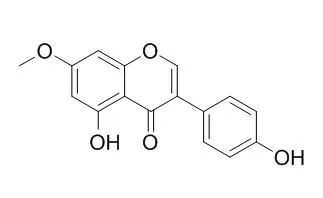| Kinase Assay: |
| Food Chem Toxicol. 2013 Aug;58:124-32. | | Anti-inflammatory effect of prunetin via the suppression of NF-κB pathway.[Pubmed: 23597450] | Prunetin is an O-methylated isoflavone, which is found in Prunus yedoensis. To date no report has been published on anti-inflammatory activities of Prunetin.
METHODS AND RESULTS:
In the present study, the anti-inflammatory effect of Prunetin on LPS-stimulated RAW 264.7 macrophage and LPS-induced septic shock model were investigated. Inducible nitric oxide synthase (iNOS), cyclooxygenase-2 (COX-2), tumor necrosis factor-α (TNF-α), interleukin-6 (IL-6), and interleukin-1β (IL-1β) expressions were determined by western blot and or realtime-PCR (RT-PCR). To elucidate its underlying mechanism, nuclear factor-kappa B (NF-κb) activation and its downstream pathways were investigated by NF-κB transcription factor assay, reporter gene expression, and western blot. In vivo anti-inflammatory effects of Prunetin were evaluated in LPS-induced endotoxemia. Promoter assay revealed that Prunetin inhibits LPS-induced nitric oxide and prostaglandin E2 production through the suppression of iNOS and COX-2 at the transcriptional level. In addition, Prunetin inhibits NF-κB-dependent inflammatory responses by modulating IκB kinase (IKK)-inhibitor κBα (IκBα)-NF-κB signaling. Consistent with these results, Prunetin significantly reduced serum levels of inflammatory cytokines and mortality in mice challenged with lipopolysaccharide.
CONCLUSIONS:
These findings offer a potential mechanism for the anti-inflammatory activity of Prunetin. |
|
| Cell Research: |
| Phytother Res. 2011 Aug;25(8):1196-200. | | Inhibition of secretion, production and gene expression of mucin from cultured airway epithelial cells by prunetin.[Pubmed: 21305630] | This study investigated whether Prunetin significantly affects the secretion, production and gene expression of mucin from cultured airway epithelial cells.
METHODS AND RESULTS:
Confluent primary rat tracheal surface epithelial (RTSE) cells were pretreated with adenosine triphosphate (ATP) for 5 min and then chased for 30 min in the presence of Prunetin to assess the effect on mucin secretion using enzyme-linked immunosorbent assay (ELISA). At the same time, confluent NCI-H292 cells were pretreated with Prunetin for 30 min and then stimulated with epidermal growth factor (EGF) or phorbol 12-myristate 13-acetate (PMA) for 24 h, respectively. The MUC5AC mucin gene expression and mucin protein production were measured by reverse transcription-polymerase chain reaction (RT-PCR) and ELISA. The results were as follows: (1) Prunetin significantly suppressed ATP-induced mucin secretion from cultured RTSE cells; (2) Prunetin inhibited the production of MUC5AC mucin protein induced by EGF or PMA from NCI-H292 cells; (3) Prunetin also inhibited the expression of MUC5AC mucin gene induced by EGF or PMA from NCI-H292 cells.
CONCLUSIONS:
This result suggests that Prunetin can regulate the secretion, production and gene expression of mucin, by directly acting on airway epithelial cells. |
|
| Animal Research: |
| Biochem Pharmacol. 2013 May 15;85(10):1525-33. | | Molecular mechanisms underlying the anti-obesity potential of prunetin, an O-methylated isoflavone.[Pubmed: 23438470] | Prunetin is an O-methylated isoflavone, which is a type of flavonoid. There are a limited number of reports detailing the biological activities of Prunetin. Although an anti-inflammatory effect of Prunetin has been reported in vitro, to our knowledge, there have been no reports on anti-adipogenic effects of Prunetin in obese animals.
METHODS AND RESULTS:
The aims of this study were to determine whether Prunetin suppresses high-fat diet (HFD)-induced adipogenesis in the liver and visceral adipose tissues of mice, and to explore the underlying mechanisms mediating the actions of Prunetin. To this end, mice were fed a HFD for 10 weeks to induce obesity, and Prunetin (10 μg/kg or 20 μg/kg) was administered in the last 3 weeks. Compared to saline-treated mice, mice treated with Prunetin showed significantly reduced body weight gain, visceral fat pad weights, and plasma glucose levels. We found that Prunetin significantly inhibited the HFD-induced upregulation of the expression of important adipogenic genes (PPARγ, C/EBPα, SREBP, aP2, LPL adiponectin, and leptin), and suppressed HFD-mediated increase in expression of lipid metabolism-related genes (SREBP, PPARγ, LXR, and HMG-CoA) in the liver tissues. Furthermore, Prunetin induced expression of adiponectin receptors 1 and 2 (adipoR1, adipoR2), as well as that of AMP-activated protein kinase (AMPK) in the liver and adipose tissue.
CONCLUSIONS:
These results suggest that Prunetin mediates anti-obesity/adipogenesis effects by suppressing obesity-related transcription through a feedback mechanism that regulates the expression of adiponectin, adipoR1, adipoR2, and AMPK. |
|






 Cell. 2018 Jan 11;172(1-2):249-261.e12. doi: 10.1016/j.cell.2017.12.019.IF=36.216(2019)
Cell. 2018 Jan 11;172(1-2):249-261.e12. doi: 10.1016/j.cell.2017.12.019.IF=36.216(2019) Cell Metab. 2020 Mar 3;31(3):534-548.e5. doi: 10.1016/j.cmet.2020.01.002.IF=22.415(2019)
Cell Metab. 2020 Mar 3;31(3):534-548.e5. doi: 10.1016/j.cmet.2020.01.002.IF=22.415(2019) Mol Cell. 2017 Nov 16;68(4):673-685.e6. doi: 10.1016/j.molcel.2017.10.022.IF=14.548(2019)
Mol Cell. 2017 Nov 16;68(4):673-685.e6. doi: 10.1016/j.molcel.2017.10.022.IF=14.548(2019)